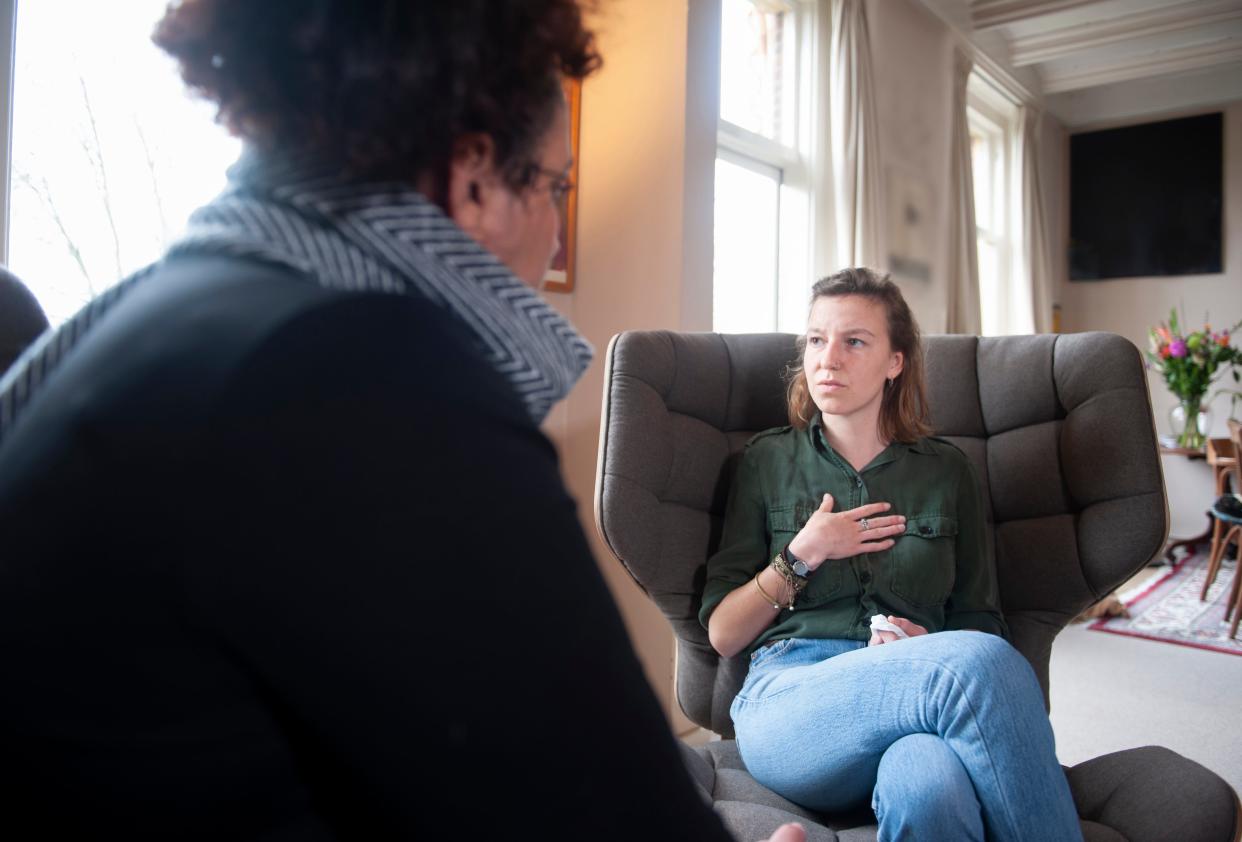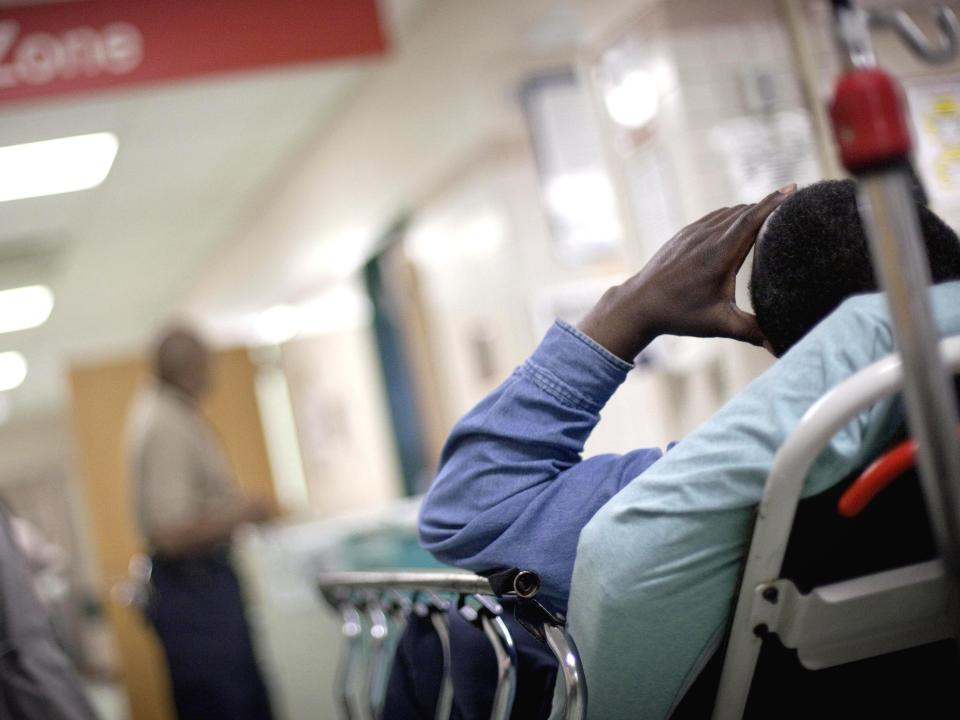4 ways mental health professionals are better trained than police to de-escalate a crisis without violence

Getty
Proponents of defunding law enforcement often suggest reallocating funds to mental health professionals.
Two psychiatrists and a licensed therapist told Insider about their years-long training in crisis control.
They also explained how police and mental health professionals can partner up.
Stonechild "Stoney" Chiefstick was killed at the hands of local police in July 2019 after he stood in a crowded park, erratically holding a screwdriver.
Neighbors say Chiefstick, an indigenous man from outside Seattle, Washington, could still be alive today if the people called to the scene were not police.
Police officers are the people residents typically call to dangerous situations. But data show that when police respond to a mental health crisis, there is a high risk of violence and death.
People with mental illness account for 1 in 10 police calls. Yet, 1 in 4 police encounters that result in the death involve a person with mental illness, a 2015 report found.
That's why some people have called to defund the police and reallocate resources to professionals who are trained to de-escalate these situations.
Insider asked three professionals about their training, and how they can (and do) work with police.
Police aren't required to do mental health training
Police aren't required to go through mental health-specific training, though some programs geared towards dealing with these situations do exist.
Some cities have Crisis Intervention Teams (CIT). Officers on these teams are specifically trained to interact with people who are mentally ill.
Memphis, Tennessee, was the first to adopt CIT in 1988 after officers shot a 27-year-old man with mental illness and substance use disorder. Now, officers on the Memphis CIT are required to do 40 hours of training with local mental health professionals. The city's 911 dispatchers also get CIT training.
Overall, the Memphis program has resulted in 80% fewer officer injuries during mental health-related calls, the National Alliance for Mental Illness found.
But CIT isn't a federal requirement. A 2019 report from the University of Memphis CIT Center found the 2,700 CIT programs account for 15% to 17% of US police agencies.
Mental health professionals learn to evaluate a person's needs from a distance, and make a tailored game plan

Crystal Cox/Business Insider
Mental health professionals are trained for years on how to handle crisis calls through reading, simulations, and real-world practice — whether they work one-on-one with patients, in a public clinic, or in a hospital.
To get her license, Rachel Wright, a licensed marriage and family therapist in New York, learned to evaluate crises from a distance to determine if mental health was involved.
"If we were riding the subway and somebody was on a tirade, just talking and screaming and going back and forth, I could probably tell you what is going on with that person," like if they had schizophrenia, or if they were high on a specific drug, Wright told Insider.
This approach is key because each mental health diagnosis is unique. A one-size-fits-all approach can easily go wrong.
Wright gave the example of an interaction she witnessed between a man and a police officer. The man was saying he saw and spoke to Jesus. The officer cut him off mid-sentence to say no one was there and he wasn't seeing Jesus. Wright said the man was going through a psychotic episode and the officer's approach could've provoked him.
"He was challenging this person's reality. In that case, to de-escalate, what you would do is ask them, 'What is Jesus saying?' You join them in their reality," Wright said. "Otherwise they're going to fight against you."
Psychiatrists-in-training do simulations to prepare

AP
Some mental health professionals go through simulations to experience what they may encounter in practice.
Dr. Zheala Qayyum, a child and adolescent psychiatrist, told Insider her students practice verbal de-escalation of an agitated patient in a hospital setting.
It starts with a patient "slowly escalating," until a point when "the patient becomes really agitated where you have to call in a behavioral code and then have staff members come in and security come in," to help physically restrain them, without risking medical complications.
Afterwards, they discuss how it went, "so that before they are in that situation by themselves, they're feeling prepared and confident in knowing what the steps are, both in the realms of verbal de-escalation and reaching the point where verbal de-escalation is not working," Qayyum said.
Local mental health workers build relationships with residents who experience regular episodes
In New Haven, Connecticut, the police have a partnership with the Child Study Center at Yale University's School of Medicine, who work with children who've experienced or witnessed violence.
In Sacramento, California, law enforcement bring mental health workers with them to respond to mental health calls as part of the city's mental health unit initiative. They may accompany someone to the pharmacy to get medication, talk down a suicidal person, or check in on homeless people.
"They know the folks there. They check in with them. They kind of have a reputation for not being there to bust you for criminal matters, but to be there to help you with mental health matters and as a resource," Dr. Amy Barnhorst, a psychiatrist at UC Davis, and a Sacramento resident, told Insider.
"They also recognize the people who are part of the mental health system. So they'll be like, 'Oh yeah, I know Robert. He's always a little bit delusional about having millions of houses in Monaco, but he's fine right now,'" Barnhorst said.
"I think somebody who didn't know this Robert guy might hear him talk about his solutions and be like, 'Oh my God, this guy's mentally ill. He needs to go to the hospital.'"
Read more:
How to talk to your non-black family members about race, according to therapists
Police brutality imagery on social media can cause lasting trauma, especially for black people
Read the original article on Insider

